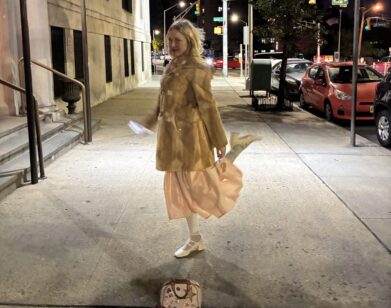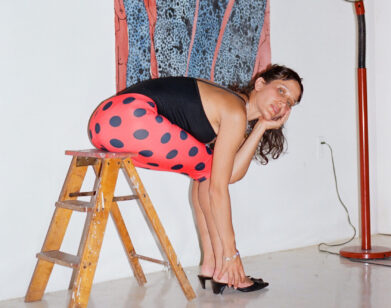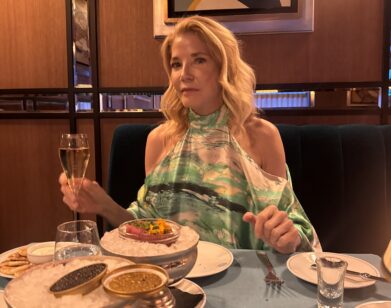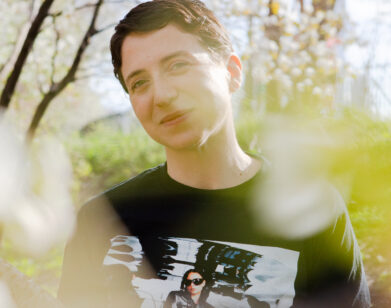LIT
Sheila Heti Was Wasting Her Time. Then She’d Written a Book.
“A writer has to follow their curiosity, first and foremost,” writes Sheila Heti in the opening chapter of her nifty and singular new book, Alphabetical Diaries. “A writer is just one person under the stars,” begins the subsequent sentence, “one person in a universe, writing about a whole entire universe.” One could read these lines as a kind of mission statement, for Heti’s literary preoccupations are indeed great in both magnitude and particularity, impelled by her relentless spirit of inquiry toward questions no less daunting and immense than the one that titles her breakout 2010 novel, How Should a Person Be?
This new book—a collection of Heti’s personal diaries, written over the course of a decade, then alphabetized and sheared into hypnotic installments of funny, plaintive, and exhortative prose—shows us how people are. Reading it, one is struck by the awesome continuity of the human mind, the way we’re always turning over the same ideas and questions, but also our naked contradictions. A declaration made in one sentence is undermined in the next, or made amusing, more complicated and thorny, and always rendered with Heti’s sense of play and conviction. “Marriage can make misery more bearable,” she writes in the “M” chapter. “Marriage is one step closer to divorce than being in a relationship. Marriage will not settle my restlessness.”
When Heti and I spoke last week, she mentioned that working on the project provided respite from the “dark emotional spaces” in which she’d had to immerse herself to write the two autobiographical novels, Motherhood and Pure Colour, that have published in the interim. But Alphabetical Diaries is no less artful or intense for having been arranged in a spreadsheet. At one point in the book, she laments the way one can lose the “wisp of life” in the process of putting thoughts and feels into words. Alphabetical Diaries, however, shows the opposite to be true.
———
SHEILA HETI: Hi.
JAKE NEVINS: Hi, Sheila. How are you?
HETI: I’m good. I feel ready.
NEVINS: Good. Well, I want to start by saying what a fan of your work I am, and that reading Alphabetical Diaries, for me, was a strange, rewarding, thought-provoking experience, both formally and emotionally. What was it like working on it?
HETI: It was confusing and disheartening a lot of the time. It took a very long time to figure out what form I wanted it to take. I mean, just to say that it’s alphabetical is the smallest decision. Should it be 500,000 words? Should it be 50,000 words? Should it be a project on the internet that you scroll through? Should it be a Twitter feed? Should it be a novel? Should it be an experimental, conceptual art project? Should every sentence be on its own line or should it be continuous, like a paragraph? There were just so many questions and it took me a really long time to feel satisfied with the form, but I am very satisfied with the form it’s in now.
NEVINS: I’m curious how you distinguish editing and writing, particularly with a project like this, which seems more like pruning a tree than growing one from soil.
HETI: It’s a good question, because I do think there’s a difference. It’s funny, I did an event with Rachel Kushner and this came up. We realized as we were talking that we both meant something different by writing. She meant writing and editing whereas, for me, I just meant putting the words down for the first time and editing as something different. But she considered editing writing, which makes me wonder if a lot of people do, because I don’t at all, and I wouldn’t call them the same thing.
NEVINS: Neither would I.
HETI: Oh, yeah?
NEVINS: For me, they offer two completely different pleasures and also challenges.
HETI: Precisely, exactly, and they feel like they use very different parts of your brain, right? I don’t know if this makes sense, but it feels like you edit with the front of your brain. You’re very conscious. You’re using your intellect in a very straightforward sort of way. But when you’re writing, it’s almost more like a dream state. You have to let go of rational thought and just accept whatever comes, because otherwise, you might miss something interesting. If you try to understand what you’re writing as you write it, you might not put it down—and there might be things that you feel compelled to write down that you don’t understand. So I feel like, with writing, you have to stand back much more, whereas with editing, you’re just in it with your thoughts, with your intellect.
NEVINS: I would imagine, then, that the process of putting this book together was especially strange, because it’s not like you were editing things that you had written a month before and needed a little distance from. You were revisiting journals and musings over the course of 10 or so years, maybe even longer?
HETI: Yeah. I think one of the reasons the book took so long is because people change really, really slowly. Even five years after writing the last diary entry, I still felt like basically the same person. And it took almost 12 or 13 years just to feel like, “No, actually, that’s not a different person but that was a different stage of life, and I can stand back from it and see it as its own world that’s not exactly my world.” But when I first started editing it, it felt so close to my world that there was no way of aestheticizing it. There was no way of seeing what the sentences all had to do with each other, what they made altogether, because it was just too close.
NEVINS: I’m curious how these journal entries existed at the time of their conception. Were they more conventional chunks of narrative text that you then plucked certain sentences from?
HETI: Well, when I wrote them, I wrote them all on the computer, so I actually just put all of the diaries into the spreadsheet. I started the project with all those diaries already alphabetized, and only once they were alphabetized did I start to sift through them and cut.
NEVINS: What was the emotional experience of revisiting them?
HETI: It’s just interesting, once you start editing them how consistent the mind is in its contradictions but also in its patterns and also in its very limited set of preoccupations. I only write in a journal when I’m feeling kind of intensely, so there’s an intensity of emotion in a lot of the entries. But then I think, actually, there’s a lot of that in life, too. There’s a lot of intensity of emotion. It almost seems so strange to look at the diaries and to see how much feeling went into things that had, in retrospect, no lasting consequence at all.
NEVINS: What a relief.
HETI: I guess it is a relief.
NEVINS: I imagine, if I were to embark on a project like this, that there’d be things I encountered that I rejected intensely, or maybe I’d be wistful for a past version of myself. And yet all of it’s in there, and I think that’s part of the beauty and candor of the book. So, aside from the formal constraints and dictates that you were following, was there any kind of guiding principle to what stayed and what didn’t in service of the larger project?
HETI: It sounds kind of ridiculous to say, but I just wanted to keep the better sentences in, the more interesting ones, the ones that made sense out of context. Because not every sentence did. There were sentences that had no style or beauty or interest in them, so I took those out. I tried to leave the sentences that could be read on their own and had a certain kind of tone or a certain resonance or a certain mood. And then, in cutting, I would cut the sentences that got in the way of the potential of two other sentences adjoining each other and creating something very funny or something very interesting.
NEVINS: Which often resulted in some very funny joke constructions, by the way. Like, “Mom said she can’t really respect someone who hasn’t worked hard and made something of themselves. Mom said, some women want Brad Pitt, that doesn’t mean they can have him.” The cadence of it reminded me of my own Boomer parents. Did you enjoy the process of stitching jokes together?
HETI: Yeah, I did. And it’s kind of like a discovery. You realize, “Oh, if I actually cut these 12 sentences, then this could be a good joke.” So it’s a weird way of writing because you’re searching for the joke rather than explicitly writing it. You’re trying to see, “How can I make a joke out of everything that’s here?” And the only way to make a joke is to cut sentences, because you can’t write new ones.
NEVINS: You’ve got to kill your darlings. I love to hear that your guiding principle, to the extent that there was one, was the sentence, because I felt like this book as a whole marks some sort of restoration of the primacy of the sentence as a worthwhile craft in and of itself. I don’t want to make any sweeping and ultimately reductive characterizations of contemporary literature, though, so I’ll simply ask if that differed from your approach to your past books.
HETI: Oh, yes. When I wrote my first novel, which was my second book, Ticknor, I was really trying to make beautiful sentences. And then with How Should A Person Be?, I didn’t want to think about style at all. I wanted something that sounded like speech, something kind of messy and something that looked like it hadn’t been worked over, even though it had. With Motherhood, I wasn’t thinking too much about the sentence, and with Pure Colour, not quite so much. So yeah, I think you’re right. There was very little else to think about with putting this together. I did think about character in the sense of, “Oh, if I have this sentence in here, it will jar with this character that is being created by these other sentences.” But I couldn’t even edit that much because I really wanted to keep the sentences as I’d written them in the diary, because it is sort of a conceptual art project and it doesn’t really work if you change the sentences too much. The sentences have to already be good, you know?
NEVINS: There are a few serendipitous moments where these diaries seem to refer to the book in hand. For instance, you write, “It would be nice to make a book of all the little injunctions you have towards yourself.”
HETI: That sentence was a lucky accident because I think I wrote that to myself while I was writing How Should a Person Be? And that was years before I thought of this diary project, but I did keep in those sentences that seemed like they were talking about this book, because I think there’s an impulse to help people a little bit with how to read it, and maybe it’s reassuring to the reader that all these things that they’re encountering are intentional.
NEVINS: Was it a concern of yours that the book might be too far afield of your previous work, or too plotless?
HETI: Yeah, I think I wasn’t sure how it would feel to other minds. I showed versions of this book when it was much longer and when every sentence was on its own line. I showed versions to writer friends of mine who weren’t very enthusiastic about the project. So I didn’t think it was inevitable that it would be something fun to read. But by the end, I was thinking, “That’s what I want, actually.” I want to make something entertaining, because there’s a way in which honoring the initial concept of the project would not be making it entertaining, it would be making a choice to be very comprehensive and to put all the sentences in and not worry about the audience, to be very much like an experimental, conceptual artist and say, “Here’s proof of the concept.” But by the very end, the last couple of years of working on it, I kind of decided I wanted it to work like a novel. So that allowed me to edit a little more, to move sentences around. I let myself make those little choices so that it would be fun to read the way that a novel that you’re enjoying reading is.
NEVINS: I think those choices are crucial to the sort of internal rhythms of the book. I almost experienced it like you might the tracks on an album, understanding each chapter as variations on a form.
HETI: I think tracks on an album make sense. I spent a lot of time rereading chapters beginning to end. The endings of the chapters were really important too, to end on a special note that sounds like the conclusion of a short story or is a joke or even negates what came in the whole chapter leading up to that sentence.
NEVINS: You were writing other books while working on this one, right?
HETI: Yeah, I would work on this when I didn’t feel like working on Motherhood or Pure Colour. I was just like, “I can’t go into those dark emotional spaces today, this week, this month,” but I still wanted to work, so maybe I’ll play around with that. And playing around with the diary project, it felt more like a waste of time. It felt more like playing Tetris or something.
NEVINS: Well, it was all leading to something.
HETI: If you waste your time in the right way for 14 years, you might end up with a book at the end.
NEVINS: Well, when you weren’t writing or wasting your time productively, what were you reading as you worked on Alphabetical Diaries? And what books, if any, influenced the form?
HETI: Do you know the writer, Kenneth Goldsmith? He’s an experimental writer and he wrote this book called Soliloquy in the nineties. It was far and away the biggest influence on my thinking around this book and the fact that I’d made this book at all. He spent a week tape recording himself from the moment he woke to the moment he went to sleep. It was recording constantly. So he’s just going about his day, and then at the very end of the week, the project was done, and he went back and transcribed all the tapes. Each day is a different chapter—Monday, Tuesday, Wednesday, Thursday. And it’s just everything he said, with all the ums and ahs and you knows and likes, and it’s all one long paragraph for each day. There’s no stage directions, there’s no sense of when he’s talking to the dog, when he’s talking to his wife, when he’s talking to the bus driver. That was the book that made me think this project should be every sentence from my diary. But what’s interesting about Kenny’s book is that you can’t read it, because it doesn’t make any sense. It’s unwieldy, it’s long, it’s boring. It’s just impressive and amazing. It might be out of print but I can send you a PDF.
NEVINS: Oh, please do. I’m intrigued.
HETI: Kenny Goldsmith actually edited the book of Andy Warhol interviews [I’ll Be Your Mirror: The Selected Andy Warhol Interviews].
NEVINS: Apropos of nothing in particular…
HETI: Yeah, so it’s all part of this documentation of life, the dumbness of it.
NEVINS: My last question: do you have a favorite lettered chapter?
HETI: “Q.”
NEVINS: That one’s really short, right?
HETI: Yeah. It’s just one sentence. “Quiet days, not seeing people, feeling fine.” That’s just something to aspire to.
NEVINS: It is. But as you head out on book tour, you might have to wait a bit for quiet days. Anyway, thanks for talking to me, Sheila.
HETI: Thank you. It was nice talking to you.







